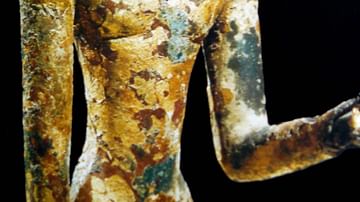Phoenician names are generally composite words with a specific meaning. The naming of children had a significance in the Ancient Near East that is difficult to understand nowadays. By choosing a name for their child, the parents could not only celebrate their joy of having created life, but they believed that the naming of the child would greatly influence which divine being would benevolently influence the life of the child. Thus Phoenician names frequently were dedications to a specific deity, or wishes regarding which deity should guard over the child's life.
This becomes clear when examining some Phoenician names:
Abdhamon (servant of Hamon)
Abibaal (Baal is my father)
Abirami (god-father is elated)
Adonibaal (Baal is my lord)
Ahinadab (my god-brother was noble)
Ahirom (god-brother is elated)
Ahumm (brother of the sea)
Azmelqart (Melqart is powerful)
Baaliahon (so that Baal favors)
Baaliaton (Baal has given)
Barekbaal (Baal has blessed)
Batnoam (son of charm)
Bōdashtart (From the hand of Astarte)
Eshmounhilles (Eshmoun has saved)
Eshmouniaton (Eshmoun has given)
Hannibal (favored by Baaal)
Itthobaal (Baal is with him)
Melqart-shama' (Melqart has listened)
Paltibaal (my refuge is Baal)
Sikarbaal (Baal has remembered)
Ummashtart (Astarte is my mother)
Urumilki (Milki is my light)
Yada'milk (Milk has known)
Yehomilk (so that Milk makes life)
Common prefixes are "Abd-" (servant of, cf. Abdhamon), "Mithon-" (gift of), "Ben-" (son of), "Ger" (proselyte), and "Hanni-" (favored by, cf. Hanniba[a]l).
This text is available in other languages:
Bibliography
- M. Gras, P. Rouillard, J. Teixidor. L'univers phénicien. Hachette Littératures, 1995, 37-47.
About the Author
Translations
Arabic French Portuguese SerbianWe want people all over the world to learn about history. Help us and translate this article into another language!
Free for the World, Supported by You
World History Encyclopedia is a non-profit organization. Please support free history education for millions of learners worldwide for only $5 per month by becoming a member. Thank you!
World History Encyclopedia is a non-profit organization. Please support free history education for millions of learners worldwide for only $5 per month by becoming a member. Thank you!
Become a Member Donate






